[October 27, 2025]
On Sunday, October 26, Lincoln
Christian Church held a Harvest of Talents celebration during all
three worship services.
The service began with songs led by Sherilyn Bolton and other
members of the worship team.
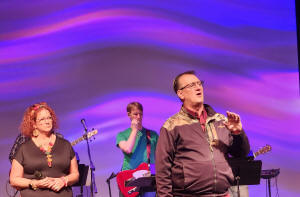
Lincoln Christian
Church’s Lead Pastor Ron Otto said we are
celebrating what has been accomplished. He reminded
everyone all the money raised at the Harvest of
Talents goes to feed hungry people and then said
Jesus wants you and your praise.
As Otto prayed, he thanked God for the harvest and
the way gifts will be multiplied.
Bolton said it is not just about the funds raised,
but about taking the gospel to the ends of creation.
The communion meditation, which was streamed on
video, was offered by Caleb Chestnut of Kosovo Life
Ministry. He represented one of the countries that
receives help through the money raised by Harvest of
Talents.
In the meditation, Chestnut spoke of teaching a
Muslim friend about who Jesus really is by reading
him Matthew 26:26-28. This passage, which talks
about the last supper says, “While they were eating,
Jesus took bread, and when he had given thanks, he
broke it and gave it to his disciples, saying, “Take
and eat; this is my body.” Then he took a cup, and
when he had given thanks, he gave it to them,
saying, “Drink from it, all of you. This is my blood
of the covenant, which is poured out for many for
the forgiveness of sins.”

From this verse,
his friend made a connection between the Passover
celebration of the Jews being saved from Egypt by
the blood of the lamb and Jesus asking the disciples
to remember what his blood and body would do for
them as they drank the cup and ate the bread.
In reflecting on these verses, Chestnut said we need
to remember the sacrifice Jesus made for the
forgiveness of sins so we can have eternal life.
Next Chestnut talked about how IDES (International
Disaster Emergency Service) partners with the Kosovo
ministry for food distribution, which gives them a
chance to minister to people as they give them food.
He read 2 Corinthians 9:7, which says, “each of you
should give what you have decided in your heart to
give, not reluctantly or under compulsion, for God
loves a cheerful giver.” Chestnut thanked the
congregation for cheerfully giving and being a part
of the ministry here and around the world.
Harvest of
Talents fundraising total announcement - Video
Harvest of Talents Co-Chair Natalie Morris said we
are so happy to be here to celebrate with all of
you. She said the hymn “Little is Much When God is
in it” kept going through her head and God has
proven that with the 42nd Harvest of Talents.
Then Morris thanked everyone and said throughout the
year, the team has a phrase “every hand grows the
harvest.” She said there is no way Bethany and I can
do it on our own. It takes a lot of hands, and you
have so graciously provided it.
Morris said they had the privilege this week of
seeing some of you bringing your offerings to the
God. She talked about some who made items for the
Harvest of Talents. Their ages ranged from the
Lincoln Christian Church preschoolers who threaded
plastics beads on pipe cleaners to make Indian corn
to a widow in her 80s who made candy with a recipe
her deceased husband used for many years to make his
offering for the harvest.
With all the harvest offerings that came in, Morris
said God multiplies what you put in his hands, and
he has faithfully shown it this year with the 42nd
Harvest of Talents.
H.O.T. Co-Chair Bethany Henry then let everyone know
that between 9 and 12 Saturday, 14,688 G.A.P. meals
were packed. She said the total meals will be given
this year in the name of Jesus and his good news is
67,855.
Henry then announced the total raised at this year’s
Harvest of Talents was $113,019.05. She offered the
check to IDES Executive Director David Stine. After
a round of applause, the congregation sang “Praise
God from whom all Blessings Flow.”
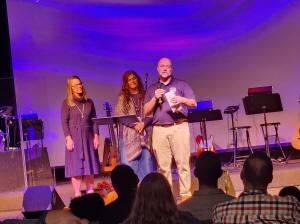
Stine gratefully
accepted the check and said what the church does
provide hundreds of thousands of meals to feed the
hungry. Not only that, but it has inspired multiple
churches to do the exact same thing. It has
multiplied the church’s efforts, which is what God
does anyway.
On behalf of himself, his team, the IDES board,
their partners and the people receiving the food,
Stine said thank you so much for the many people you
guys bless.
Otto said the Harvest of Talents takes lots of
people pulling together. He asked the H.O.T.
leadership team to stand and be recognized. Then
Otto asked anyone who created something, baked
something, bought something or even just ate
something that would be used to feed hungry people
to stand.
Part of what IDES does is help places around the
world who have experienced emergencies like
hurricanes and tornadoes. When people are leaving
areas, Otto said IDES trucks are pulling in to bring
water and supplies.
The second part of IDES ministry is feeding hungry
people, and Otto said this is where all the Harvest
of Talents money goes. He asked the IDES team to
stand.
Otto then introduced Makayla Amalla, who works with
COPE (Children of Pokot Education) in Africa. Otto
said COPE receives Harvest of Talents funds.
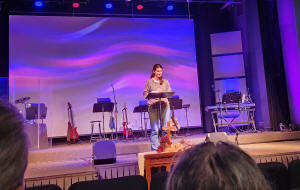
Amalla and her
husband are the Executive Directors of the COPE
ministry and serve the Pokot tribe in West Pokot,
Kenya. The ministry receives funds from the Harvest
of Talents to run its entire relief food program.
With this program, Amalla said they feed around 300
families and up to 3000 people every week in the
village. The program brings about 15,000 pounds of
food to the village every month. She called it
life-changing and lifesaving and said they are so
thankful. It has also led to eleven baptisms, which
Amalla said is incredible.
Feeding hungry people is so important and it makes a
huge difference to have food where there are food
insecurities, but Amalla said Jesus makes all the
difference.
On this celebration Sunday, Amalla said we are
celebrating a yearlong chapter of an over 40 year
effort to serve the Lord by serving the least of
these. There are people who have put blood, sweat
and tears into this effort. They are great
matriarchs and patriarchs of Christian service. She
said many of us can only pray to leave a legacy that
holds a candle to the ones they formed over a
lifetime.

In her message,
Amalla talked about Moses, who wrote the first five
books in the Bible. Moses led the Israelites out of
slavery in Egypt and led the Israelites for almost
40 years in the wilderness. He was revered as a
great father, leader and even savior of the Jewish
faith of Abraham. Amalla said Jesus was even
compared to Moses.
Deuteronomy 34:10-12 says, “Since then, no prophet
has risen in Israel like Moses, whom the Lord knew
face to face, who did all those signs and wonders
the Lord sent him to do in Egypt—to Pharaoh and to
all his officials and to his whole land. For no one
has ever shown the mighty power or performed the
awesome deeds that Moses did in the sight of all
Israel.”
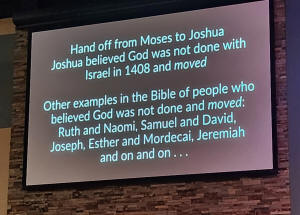
God worked through
Moses from 1446 B.C. to 1408 B.C., but Amalla said
God was not done with Israel. When Moses’ legacy
ended, leadership was handed off to Joshua, who was
one of the twelve spies who went to look in on the
land of Canaan before the Israelites went there.

[to top of second column]
|

Joshua and Caleb
were the only two spies who came back and said God can do what
he said he was going to do. All the other spies looked at the
size of the problem, the giant and the territory. They looked at
the size of the promise, the land flowing with milk and honey
and they said either God is too small or we are just not worthy
enough because there isn’t any way we are getting to that land.
However, Amalla said Joshua believed
God could accomplish the goal before he knew God was going to use
him to do it. Joshua believed God was not done with Israel in 1408.
As Amalla said, we could go on and on about people in the Bible who
had faith to say God is not done because my predecessor is gone.
These people said, “I am not going to move. I’m going to let God use
me.”
Examples Amalla listed people in the Bible who believed God was not
done and moved are Ruth and Naomi, Samuel and David, Joseph, Esther
and Mordecai, Jeremiah and many more.
For Amalla, the point is, “if we believe God is not done, what is
keeping us
from moving? What is keeping us from jumping in?”
Stanford University did a study on why there has been a sharp
decline in people volunteering over the last decades. Amalla shared
the top three reasons Stanford said people give for not serving. The
first one was “I don’t have time.” The second one was “It’s not in
my interest [or] rewarding enough—I am not qualified.” The third one
was “no one asked me.”
When people say I don’t have time, Amalla said it is true because
our society has never been busier. Our culture worships full
schedules and productivity and many truly don’t have time for one
more thing. Society says your kids need to be in this many clubs or
you need to work this many hours. If your spouse is not working,
they need to be accomplishing a lot at home. No one has time for
anything.
Then there are crippling addictions to social media and streaming
services. Studies show people spend four or more hours on their
phones each day.
Amalla said we have gone wrong because we have majored in minors.
People focus on the wrong things, and our lives are out of order.
John Mark Comer’s book Practicing the Way has a good take on how to
do it. Amalla read an excerpt that said, “the call to apprentice
under Jesus is not a call to do more, but to do less. It is not
addition, but subtraction. It is not about increasing complex
activity but about pursuing simplicity.”
Comer’s book says, Jesus is calling you to slow down and simplify
your life. The three goals of an apprentice are to be with your
rabbi, become like him and do as he did.
To Amalla, the elephant in the room is the vast majority of us have
far too much going on to add Jesus into our overly busy schedules.
She said there is no way to follow Jesus without unhurrying your
life.
We need to restructure our lives around being with our rabbi, like
our rabbi and doing what he did. Amalla said this includes
activities like praying, being quiet with the Lord, being with the
lost where they are and serving.
When people say, “I am not qualified,” Amalla feels there is a
misconception we have to be experienced to serve, or it has to make
sense with our careers. For instance, nurses may feel they should be
working in a clinic. Some may say, what do I know about working in a
soup kitchen or greeting at an event or even say I am wasted on
those sorts of roles.

In challenging this thinking,
Amalla said your college degree or profession may not line up with
what God has called you to serve in. You may feel you are being
called to something way out of your comfort zone and feel
underqualified. It may involve speaking at an event. going to
another country, volunteering at a VBS or visiting a prison.
We see predecessors, pastors who speak every Sunday, missionaries
who come halfway across the world and saints like Pat Snyder and
Barb Odonohue and we feel dwarfed by their accomplishments and
spiritual high ground.
Something Amalla said we miss is God is doing the thing, and we are
just the vessel. In fact, the less self-important we are, the better
because then we have no delusion about our ability to accomplish
anything on our own.
Looking at Moses’ “resume,” Amalla said God called Moses to free
slaves from Pharaoh and lead them through the desert to the promised
land. Moses had no public speaking qualifications partly because he
had a speech impediment. Moses had no ability to relate to his
people because he grew up with a silver spoon place in his mouth by
the ones who enslaved these people. There was nothing any of the
people wanted to hear from him. Moses was also a wanted murderer.
However, Amalla said God used Moses in incredible ways. None of that
stuff got in the way when God decided to use Moses.
Amalla and her husband felt they did not meet a single criterion for
the mission field. Neither of them had a degree in ministry, they
had both been divorced and their background was military and
medical. She said what did we know about serving in a remote tribe
in Kenya and running a school.

Though they felt they had nothing
to offer COPE except willing hearts, Amalla said God’s call on their
lives was undeniable. She is sure many we put on a pedestal today
have similar stories. We are not limiting factors for God. We are
just God’s vessel.
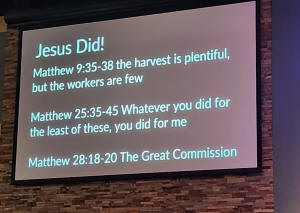
In response to people who say, “no
one asked me,” Amalla said as Christians, we have a general call to
serve. We see Jesus putting out the call to serve in all the
gospels. She discussed three verses from Matthew reminding us what
Jesus asks. Matthew 9:35-38 tells us the harvest is plentiful, but
the workers are few. In Matthew 25:35-45, Jesus talks about taking
care of the hungry, the thirsty and those needing clothing and
reminds the righteous “whatever you did for the least of these, you
did for me.”
Matthew 28:18-20 is the great commission from Jesus telling everyone
to “go and make disciples of all nations, baptizing them in the name
of the Father and of the Son and of the Holy Spirit, and teaching
them to obey everything I have commanded you.”
We should not wait to be asked but look around and see what needs to
be done.
Amalla quoted a line from the show Robots saying, “see a need, fill
a need.” She said people who serve do not have more hours in the day
than everyone else. They don’t have a list of qualifications. and
they are not always handpicked out of a crowd.
They are people who center themselves around their rabbi to be with
him, to be like him and do as he does. They believe God is not done
working and are willing to be his vessel. They are able to look at
their community, see the needs and empty themselves.
Something Amalla encouraged everyone to do is to find a way to plug
in. She said patriarchs and matriarchs have been running a race of
servitude and being the hands and feet of Jesus around the track but
have a baton in their hand.
In the 4 x 400 meter relay, people pass a baton to others after
sprinting around the track. Amalla said these matriarchs and
patriarchs have a baton in their hand. They are running and doing
their part but are counting on you to have your hand out ready to
catch the baton and run your leg of the race.
Amalla gave a benediction she wanted the congregation to take and
apply in their lives. It came from Hebrews 12:1-3, which says,
“therefore, since we are surrounded by such a great cloud of
witnesses, let us throw off everything that hinders and the sin that
so easily entangles. And let us run with perseverance the race
marked out for us, fixing our eyes on Jesus, the pioneer and
perfecter of faith. For the joy set before him he endured the cross,
scorning its shame, and sat down at the right hand of the throne of
God. Consider him who endured such opposition from sinners, so that
you will not grow weary and lose heart.”
The service drew to a close with a time of invitation. Sherilyn
Bolton reminded everyone when we feel unqualified, the Lord provides
the skill. When we are tired, the Lord provides energy. When we are
feeling lost, the Lord provides the way.
[Angela Reiners]
|